Ethical challenges, decision-making and end-of-life care in nursing homes
Doctoral thesis
Permanent lenke
https://hdl.handle.net/1956/15598Utgivelsesdato
2017-02-13Metadata
Vis full innførselSamlinger
Sammendrag
Background: Many nursing home residents suffer from multimorbidity, frailty and dementia. A number of ethical challenges are connected to living and dying in nursing homes. Objective/purpose: This thesis investigates ethical challenges, decision-making and end-oflife care in nursing homes. The research focuses on the views of residents, relatives and staff on these topics. Materials and methods: The studies relied on a mixed methods approach. Qualitative research was based on qualitative description and interpretive description. In-depth interviews with nursing home residents and focus group interviews with relatives and nursing home staff were conducted. Questionnaires were used to collect data on ethical challenges in nursing homes and to document ethics discussions in five institutions in Austria, Germany and Norway. Results: From the perspective of residents and relatives, ethical challenges in nursing homes are mostly connected to everyday ethical issues. Residents trust relatives, physicians and nurses to make important decisions on their behalf, but many relatives do not know the resident’s wishes, and experience decision making as a burden. Many staff members describe ethical challenges as a burden and appreciate systematic ethics work. The most frequent ethical challenges are lack of resources, end-of-life issues, advance care planning and coercion. Ethics meetings can help to reach consensus in over three-quarters of cases. To implement systematic ethics work in nursing homes, time for reflection, ethics education and support from the management are needed. Residents were entirely absent in the documented ethics meetings. Conclusion and consequences: Both end-of-life issues and everyday ethical challenges are important in nursing homes. As relatives are often insecure about the wishes of residents, preparatory conversations about treatment preferences and advance care planning should be offered. Systematic ethics work should be implemented in all nursing homes. The regular participation of relatives, physicians and residents in ethics discussions should be encouraged. The participation of residents may strengthen their feelings of autonomy and dignity. Future perspectives: Further research should aim to investigate strategies to improve the participation of residents in ethics discussions. Research into the views of residents with cognitive impairment is lacking, due to methodological and ethical barriers. The advantages and disadvantages of different models for systematic ethics work in nursing homes need to be explored in more detail.
Består av
Paper I: Bollig G, Gjengedal E, Rosland JH. Nothing to complain about? – Residents’ and relatives’ views on a “good life” and ethical challenges in nursing homes. Nursing Ethics 2016, 23(2): 142-53. The article is available at: http://hdl.handle.net/1956/10564Paper II: Bollig G, Gjengedal E, Rosland JH. They know! - Do they? A qualitative study of residents and relatives views on advance care planning, end-of-life care, and decision-making in nursing homes. Palliative Medicine 2016, 30(5): 456-70. The article is available at: http://hdl.handle.net/1956/11728
Paper III: Bollig G, Schmidt G, Rosland JH, Heller A. Ethical challenges in nursing homes – staff’s opinions and experiences with systematic ethics meetings with participation of residents’ relatives. Scandinavian Journal of Caring Sciences 2015, 29(4): 810-23. The article is available at: http://hdl.handle.net/1956/10816
Paper IV: Bollig G, Rosland JH, Gjengedal E, Schmidt G, May AT, Heller A. A European multicenter study on systematic ethics work in nursing homes. Scandinavian Journal of Caring Sciences 2016. The article is available at: http://hdl.handle.net/1956/15597
